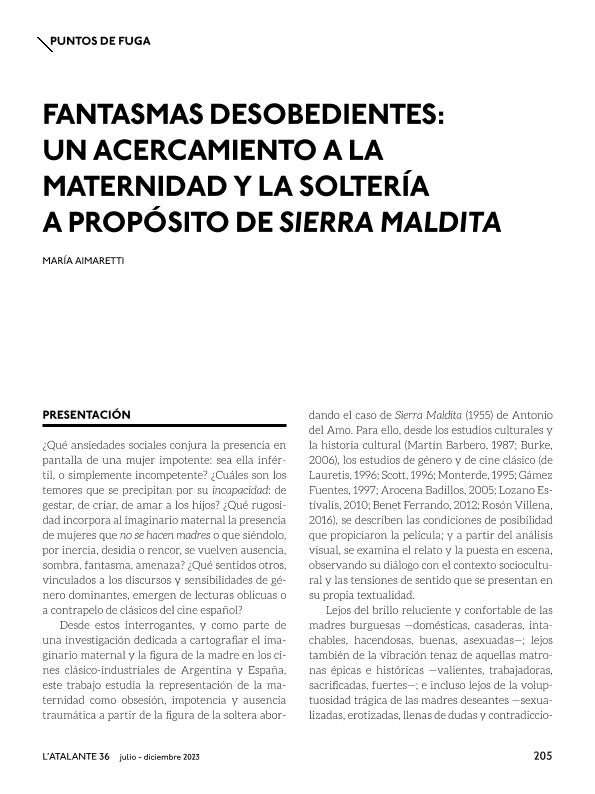Mostrar el registro sencillo del ítem
dc.contributor.author
Aimaretti, Maria Gabriela

dc.date.available
2023-12-20T15:34:44Z
dc.date.issued
2023-07
dc.identifier.citation
Aimaretti, Maria Gabriela; Fantasmas desobedientes: Un acercamiento a la maternidad y la soltería a propósito de Sierra maldita (Antonio del Amo, 1955); El Camarote de Père Jules; L' Atalante; 36; 7-2023; 205-220
dc.identifier.issn
1885-3730
dc.identifier.uri
http://hdl.handle.net/11336/220950
dc.description.abstract
Este trabajo estudia la representación de la maternidad como obsesión, impotencia y ausencia traumática a partir de la figura de la soltera, abordando el caso de Sierra Maldita (1955) que, producida por Almasirio y estrenada en Madrid el 30 de enero de 1955, fue dirigida por Antonio del Amo y ganadora de varios premios. Situándose en el ámbito rural-folklórico, sospechamos que esta película permite, a través del uso de una leyenda y de cara a los cambios socio-culturales suscitados a mediados de los cincuenta, dar forma metafórica al miedo y la ansiedad sociales respecto del control sobre los cuerpos de las mujeres y su capacidad reproductiva, y representar/exorcizar, en una figuración puntual, la soltería. El artículo ubica la cinta en la diacronía de la historia del cine español y, a partir del análisis visual, examina el relato y la puesta en escena, observando su diálogo con el contexto socio-cultural y las tensiones de sentido que se presentan en su propia textualidad.
dc.description.abstract
This work studies the representation of motherhood as obsession, impotence and traumatic absence from the figure of the single woman, addressing the case of Sierra Maldita (1955) which, produced by Almasirio and premiered in Madrid on January 30, 1955, was directed by Antonio del Amo and winner of several awards. Situated in the rural-folkloric environment, we suspect that this film allows, through the use of a legend and in the face of the socio-cultural changes that occurred in the mid-fifties, to give metaphorical form to social fear and anxiety regarding control over women’s bodies and their reproductive capacity, and represent/exorcise, in a punctual figuration, singleness. The article places the film in the diachrony of the history of Spanish cinema and, based on visual analysis, examines the story and the staging, observing its dialogue with the socio-cultural context and the tensions of meaning that are presented in its own textuality.
dc.format
application/pdf
dc.language.iso
spa
dc.publisher
El Camarote de Père Jules
dc.rights
info:eu-repo/semantics/openAccess
dc.rights.uri
https://creativecommons.org/licenses/by-nc-nd/2.5/ar/
dc.subject
CINE ESPAÑOL
dc.subject
MUJERES
dc.subject
MATERNIDAD
dc.subject
SOLTERIA
dc.subject.classification
Estudios sobre Cine, Radio y Televisión

dc.subject.classification
Arte

dc.subject.classification
HUMANIDADES

dc.title
Fantasmas desobedientes: Un acercamiento a la maternidad y la soltería a propósito de Sierra maldita (Antonio del Amo, 1955)
dc.title
Disobedient ghosts: An approach to motherhood and singleness about Sierra Maldita
dc.type
info:eu-repo/semantics/article
dc.type
info:ar-repo/semantics/artículo
dc.type
info:eu-repo/semantics/publishedVersion
dc.date.updated
2023-12-19T23:24:26Z
dc.journal.number
36
dc.journal.pagination
205-220
dc.journal.pais
España

dc.journal.ciudad
Valencia
dc.description.fil
Fil: Aimaretti, Maria Gabriela. Consejo Nacional de Investigaciones Científicas y Técnicas; Argentina. Universidad de Buenos Aires. Facultad de Ciencias Sociales. Instituto de Investigaciones "Gino Germani"; Argentina. Universidad de Buenos Aires. Facultad de Filosofía y Letras. Instituto de Artes del Espectáculo "Dr. Raúl H. Castagnino"; Argentina
dc.journal.title
L' Atalante
dc.relation.alternativeid
info:eu-repo/semantics/altIdentifier/url/https://www.revistaatalante.com/index.php/atalante/article/view/1047
Archivos asociados
